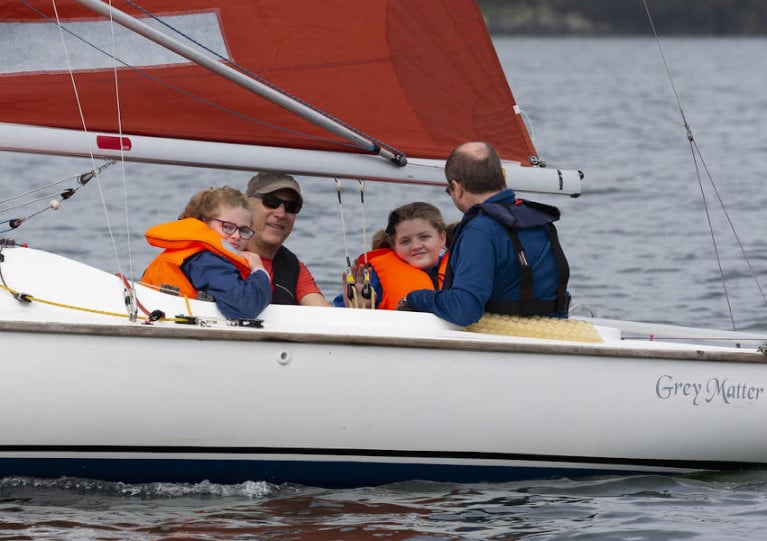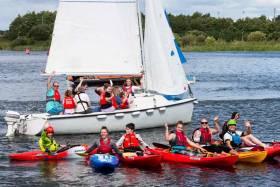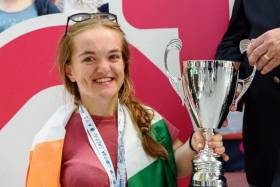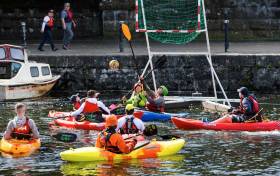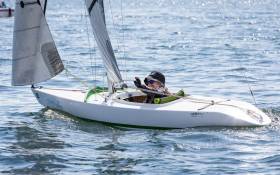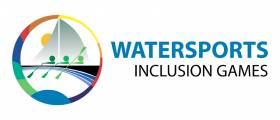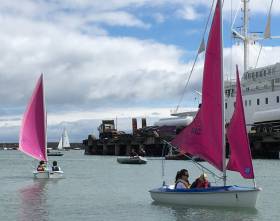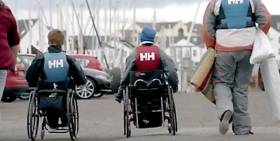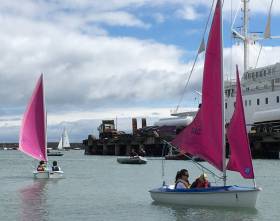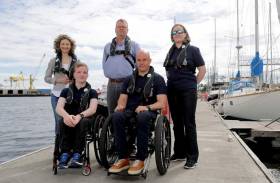Displaying items by tag: Watersports Inclusion Games
Watersports Inclusion Games Cancelled Over Coronavirus Concerns
This year’s Watersports Inclusion Games, which had been set for 5-6 September at Lough Derg Yacht Club, have been cancelled over continued coronavirus concerns.
In a statement, Irish Sailing said that “the current trajectory of the virus spread, coupled with the logistics, people involved and format of the event brought us to this decision”.
Ireland’s national governing body for sailing expressed its thanks to all “who worked so hard in trying to bring this year’s Inclusion Games to fruition”.
Lough Derg YC will instead host next year’s games, being planned for 18-29 June 2021.
The news follows the cancellation of the Women at the Helm Regatta later this month over similar concerns.
More than 250 people with physical, sensory, intellectual and learning disabilities are set for a ‘splashing’ good time this weekend when they take to the water for the third annual Watersports Inclusion Games in Kinsale this weekend.
This year’s participants will have the opportunity to try more sports than ever before, with an expanded range including sailing, kayaking, canoeing, paddle-boarding, rowing, surfing, water skiing and powerboating all on offer. The Games take place at Kinsale Yacht Club in Co Cork on 24th-25th August.
The Watersports Inclusion Games are an award-winning event organised by Irish Sailing with partners from across the watersports sector, that enable people of all abilities from the physical, sensory, intellectual and learning spectrums to take to the water to participate in a wide range of water activities.
Two-time participant John O’Grady said: “The Inclusion Games are a fantastic way of introducing many different watersports to people who might not have thought it possible to get wet. I’ve been to the last two events and I think they’re fantastic – I’ve loved introducing my friends to sailing in particular.”
Participants range in age from pre-teens to seniors and come from across the country. Some are repeat attendees, and some will be first timers. The activities are tailored to each participant’s level and ability – so no two experiences will be the same. At last year’s Watersports Inclusion Games, there were wheelchairs on Stand-Up Paddle Boards, visually impaired participants sailing solo in Galway Bay, thrilling fast-boat rides, and a hotly contested match of kayak waterpolo.
Organiser Johanne Murphy said: “Irish Sailing promotes sailing as a ‘sport for all, a sport for life’. We believe in inclusion and the elimination of barriers to accessing sport, so that sailing and other watersports can be more readily available to the one in seven (13.5%*) of people in Ireland who have a disability.” (*2016 Census)
The organisers of the Games want to let people of all abilities know that there are multiple watersports available to them, and to encourage more people from all backgrounds to get involved and out on the water regardless of ability. They aim to highlight that any barriers faced by people with disabilities can be eliminated.
There are social, health and wellness benefits associated with sailing and all watersports. These include improved muscle strength and endurance, improved cardiovascular fitness and increased agility, enhanced spatial awareness, greater mental wellness through the balancing of serotonin levels and the lowering of stress levels, improved concentration and the forging of positive relationships.
Allison Gibbons, whose son Christopher took part last year, said: “The Games introduced Christopher to sailing. Christopher displays challenging behaviour and can be quite difficult to be around, but the amazing volunteers took it in their stride, never made him or me feel bad and helped him participate as much as he was able. It was inspirational”.
Harry Hermon, CEO of Irish Sailing, added: “This is the third year of the Watersports Inclusion Games and they’re successful because of the many different strands that come together behind a single purpose, to get everyone afloat enjoying and benefitting from watersports. There are at least 11 different organisations involved in the Games – and at least 150 volunteers. Together we want to raise the profile of the Games so that everyone around the country becomes aware that sailing and other watersports are accessible to them, no matter what their circumstances”.
Four hundred and fifty participants have registered for the Watersports Inclusion Games according to Dave O’Sullivan, Commodore of Kinsale Yacht Club where a Disability Awareness Training Day this Saturday is a prelude to the hosting of the Games on the following weekend, August 24 and 25.
“Interest is overwhelming. It’s going to be a super event,” he said. “It is a huge undertaking and there are even more people on the waiting list to be participants.”
Two of the club’s own international disabled sailors are Event Ambassadors – John Twomey, 11 times a Paralympian sailor and a board member of Irish Sailing and Gina Griffin, the World Disabled Sailing Championships sailor. She came second overall in the European 2.4 Para section at Gydnya, Poland Regatta in 2017.
“This a free event, celebrating not just sailing but other watersports, rowing, canoeing, water skiing, for people of all abilities from the physical, sensory, intellectual and learning ability spectrums. We have a strong team of volunteers prepared for the event. Our preparations are well advanced and there is a wide welcome to the public to come and support an event that will show what Sailability means. Kinsale Yacht club will be at its best to show that,” says the club’s Commodore.
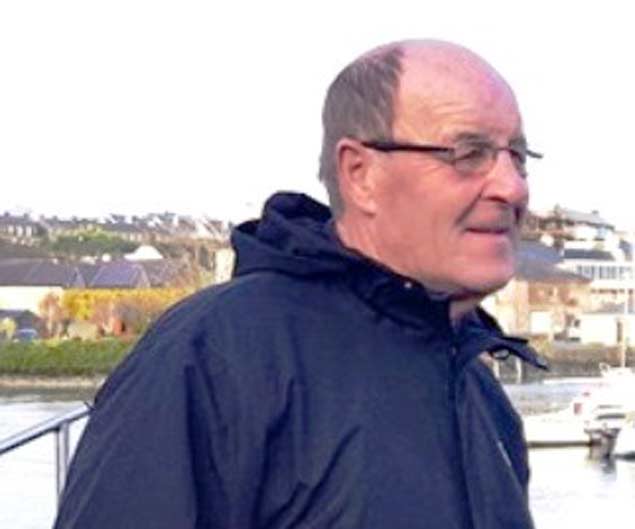 Event Director for the Watersports Inclusion Games Donal Hickey
Event Director for the Watersports Inclusion Games Donal Hickey
The Event Director is Donal Hickey who has been running Kinsale’s Sailability programme for several years.
The Games are being funded by Sport Ireland Dormant Account Sports Inclusion Fund and organised by Irish Sailing in association KYC, with Canoeing Ireland, Rowing Ireland, Cork Local Sports Partnership, Kinsale Outdoor Education Centre and supported by Spinal Injuries Ireland, Irish Waterskiing and Wakeboarding Federation, Surf 2 Heal, Sailing into Wellness and Sail Training Ireland.
This is the third year of the event, building on its success in Dublin in 2017 and Galway last year. According to Irish Sailing, it will “focus on examining, measuring and promoting the therapeutic benefits of water activity and the impact of watersports on well-being” and will exhibit the latest on adaptations and innovations for optimised watersports delivery.
“It will be a showcase of the best of inclusive watersports facilitation and a promotion of involvement in accessible watersports showing their benefits to health and well-being,” said Donal Hickey.
• Listen to more about the Games and Sailability from Donal Hickey on the Podcast below
Watersports Inclusion Games Moving To Kinsale This August
The third Watersports Inclusion Games will take place in Kinsale this August.
Building on the success of Dublin in 2017 and Galway in 2018, Kinsale Yacht Club will host the biggest showcase yet of inclusive watersports activity on Saturday 24 and Sunday 25 August.
The weekend will have the latest on adaptations and innovations for optimised watersports delivery, as well as a focus on examining, measuring and promoting the therapeutic benefits of water activity and the impact of watersports on wellbeing.
The event is organised by Irish Sailing in association with Canoeing Ireland, Rowing Ireland and Cork Local Sports Partnership, supported by Kinsale Yacht Club Sailability, Kinsale Outdoor Education Centre, Sailing Into Wellness and Spinal Injuries Ireland, and funded by the Sport Ireland Dormant Accounts Sports Inclusion Fund.
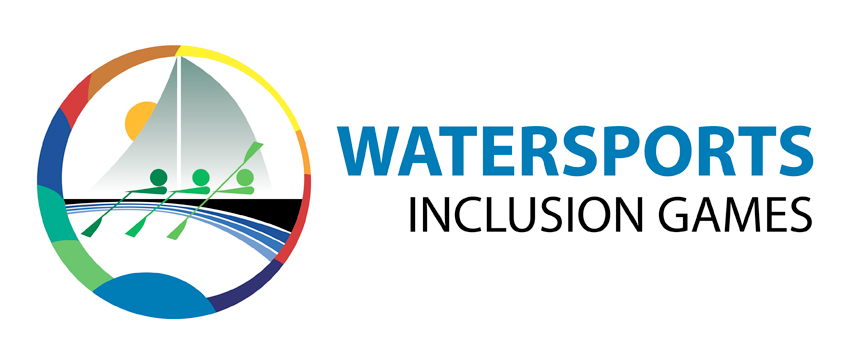
All equipment will be provided, and no experience is required for the free weekend that will include sailing, rowing, canoeing and fast boat rides, with more watersports likely to be added.
Clubs, organisations and community groups working with people with disabilities who are interested in bringing a group or individuals, or in having a presence at the expo element of the event, are invited to register their interest.
Individuals interested in attending the event with up to two family members or friends may also register, as can watersports activity providers who would like to showcase their organisation. Volunteers of all experience levels are also needed for the weekend.
Children aged under 18 and vulnerable adults attending must be accompanied by a responsible adult at all times.
For more details visit the Facebook event page. For all registrations of interest, contact Johanne at [email protected] who will outline booking details.
Galway Welcomes Nearly 200 To Second Watersports Inclusion Games
#Sailability - Galway hosted the second Watersports Inclusion Games last weekend (25-26 August) for 198 participants with all abilities on the physical, sensory, intellectual and learning difficulty spectrums.
First held in Dun Laoghaire in June 2017, the two-day event aims to show both participants and their families, as well as people who organise watersport events, that everyone can get out onto the water.
This year’s games had two elements. The Commercial Boat Club hosted introductory activities for those new to watersports, with an expanded choice including sailing, rowing, canoeing, stand-up paddle boarding and fast-boat rides.
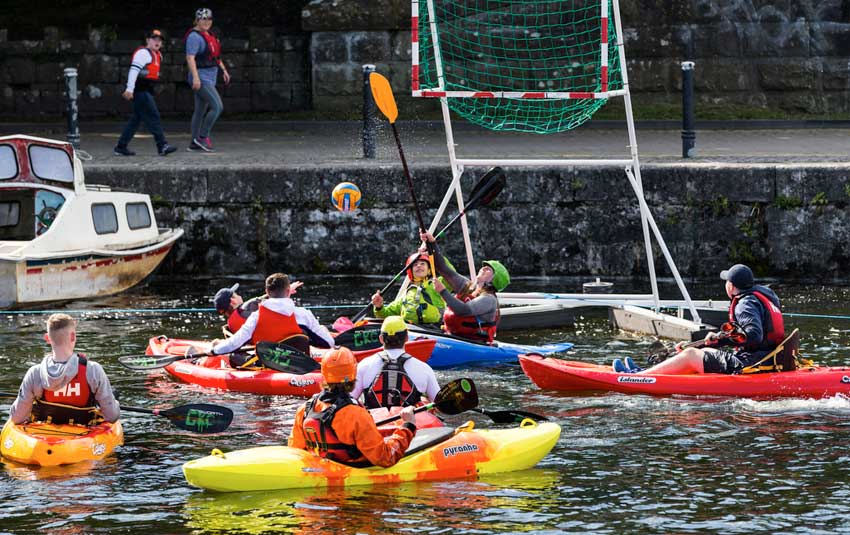
The second element was a competitive sailing event on Galway Bay with more experienced sailors including Kinsale Yacht Club’s Gina Griffin competing in the Hansa Nationals, alongside the President’s Cup which was won by Munster.
Speaking over the weekend, Irish Sailing chief executive Harry Hermon said: “This is the second year of the games, and we were delighted to welcome all of the participants from the four corners of Ireland.
“We are already starting to plan for next year’s games in Cork, when we hope to reach even more people from all abilities and encourage them to take up watersports.”
Watersports Inclusion Games Moving To Galway For 2018
#Sailabiity - This year’s Watersports Inclusion Games will take place in Galway on Saturday 25 and Sunday 26 August.
Following the success of the inaugural Watersports Inclusion Games in Dun Laoghaire last June, the second games will be hosted in 2018 on the River Corrib in Galway city at the Commercial Boat Club.
The free event celebrates sailing, rowing and canoeing for people of all abilities from the physical, sensory, intellectual and learning spectrums.
No experience is required and all equipment is provided over the weekend.
Participants and supporters can also watch competitive sailing on Galway Bay with the President’s Cup and Hansa National Championships being hosted by Galway Bay Sailing Club and Sailability Ireland, launching from Galway Docks.
The weekend is funded by Sport Ireland and organised by Irish Sailing in liaison with Canoeing Ireland, Rowing Ireland, Spinal Injuries Ireland, Galway Bay Sailing Club Sailability and Galway Local Sports Partnership, with waterside amenity at Steamer’s Quay courtesy of Corrib Navigation Trust.
Booking is required for activities and spaces are limited — to book as a participant or volunteer, contact [email protected].
For more details on the event, see the Irish Sailing website HERE.
The Watersports Inclusion Games at Dun Laoghaire Harbour last summer have made the shortlist of nominees for the 2018 Irish Sport Industry Awards.
Hosted by Irish Sailing at the Royal St George Yacht Club in late June, the inaugural event for sailors of various abilities on the physical, sensory, intellectual and learning difficulty spectrums attracted over 220 participants plus their families and volunteers to try sailing, rowing and paddling.
All those taking part gave enthusiastic feedback about the weekend, which aimed to demonstrate to participants and service providers alike that watersport is accessible to all.
The games are in the running for the Sporting Innovation of the Year Award alongside Rowing Ireland’s ‘Get Going, Get Rowing’ campaign.
Winners will be announced at the Irish Sport Industry Awards in association with JLT Ireland in Dublin’s Smock Alley Theatre next Wednesday 7 March.
Watersports Inclusion Games Video at Dun Laoghaire Harbour
Irish Sailing organised the first Watersports Inclusion Games this summer in Dun Laoghaire, County Dublin.
The aim of the Games was two-fold: to encourage people of all abilities from the physical, sensory, intellectual and learning difficulty spectrums to come and try watersports; and to show watersports providers that with a bit of training and planning, they can facilitate people of all abilities on the water.
The Games were a resounding success, with 125 volunteers providing activities for over 220 participants.
Participants and their families had a chance to try sailing, rowing, canoeing/kayaking and fast boat rides. A short film illustrates the action below
Inaugural Watersports Inclusion Games at the Royal St. George Yacht Club Attracts 220 Participants
The weekend of 24 June saw the inaugural Watersports Inclusion Games taking place in Dun Laoghaire at the Royal St. George Yacht Club with 125 volunteers providing activities for over 220 participants with various abilities on the physical, sensory, intellectual and learning difficulty spectrums and representing all ages, demographics and socio-economic backgrounds. The participants and their families had a chance to try sailing, rowing, canoeing/kayaking and fast boat rides.
Such was the popularity of Day One that Day Two saw many familiar faces and repeat attendees.
The Games aim was not just about showing participants that watersports are accessible, but also to show to watersports providers that with a little bit of training and planning, they can facilitate people of all abilities and backgrounds to get out on the water. The atmosphere during the weekend was fantastic, with participants queuing to sign up for as many different activities as possible – from rowing to 1720 keelboat sailing and yachting, to rib-tripping and kayaking under the piers.
The event would not have happened without the many volunteers who generously donated their time and expertise, and there was enthusiastic feedback from participants and volunteers – both groups saying how much fun the Games were.
The organisers were Irish Sailing, Canoeing Ireland, Dun Laoghaire Sea Scouts, Dun Laoghaire Sailability, Dun Laoghaire Rathdown County Council, Spinal Injuries Ireland and Royal St George Yacht Club, with generous resource support from National Yacht Club, Royal Irish Yacht Club, Dun Laoghaire Motor Yacht Club, and Adventure Training Ireland. The event was funded by the Sport Ireland Dormant Accounts Sports Inclusion Fund and supported by Dun Laoghaire Rathdown County Council and Dun Laoghaire Harbour Company.
Mark Pollock Launches ISA Watersports Inclusion Games Hosted By Royal St. George Yacht Club, Dun Laoghaire
Mark Pollock, Commonwealth Medal Winner in Rowing, Round Ireland Sailor, Adventurer and Cure for Paralysis activist has launched the inaugural Watersports Inclusion Games, organised by the Irish Sailing Association.
The Games is a free event which will allow people of all abilities from the physical, sensory, intellectual and learning difficulty spectrums to try watersports. Hosted by the Royal St. George Yacht Club in Dun Laoghaire, Dublin on Saturday June 25th and Sunday June 26th, the activities on offer will include sailing, rowing and canoeing.
Pollock, who lost his sight at the age of 22 and was then paralysed after a tragic accident in 2010, said, “Watersports have played a really significant role in my life. The fact that I was able to continue sailing after going blind really helped me move forward not just because of the sport itself but the camaraderie and friendships it continues to provide me with. My focus is on helping people achieve what they believe is impossible. This underpins the work I am part of, trying to find a cure for paralysis but also my involvement in events such as the Watersports Inclusion Games which is giving people who may have thought watersports would never be for them to give it a try and no doubt, have some fun in the process.”
Organised by the Irish Sailing Association in collaboration with Spinal Injuries Ireland, Canoeing Ireland and Dun Laoghaire Sea Scouts with funding from the Sport Ireland, the event will attract people of all ages, demographics and backgrounds and will look to promote both the accessibility and benefits of watersports for everyone.
There will be no charge for any of the activities and experiences at the Games; sporting equipment and any necessary instruction will be provided by fully qualified personnel. No prior experience is necessary to take part.
Harry Hermon, Chief Executive of the Irish Sailing Association commented “We are delighted to be launching the inaugural Watersports Inclusion Games. Watersports really do have something for everyone. We take pride in Irish sailing that it is a sport that people can enjoy no matter their stage in life or personal circumstances. We are encouraging anyone who thought they might like to give watersports a try to come and join us in Dun Laoghaire on the 25th and 26th of June. We are hoping that it may be the first step in a lifetime of enjoyment and friendship as part of a very vibrant watersports community in Ireland.”
Accompanying Mark at the launch were Nadine Lattimore, London 2012 Paralympic athlete and keen windsurfer and sailor, and Oisin Putt, member of the Sailability Paralympic Pathway Team. Both Nadine and Oisin are campaigning to bring parasailing back into the Olympics Games and keen to inspire everyone to get out onto the water trying different watersports.


























